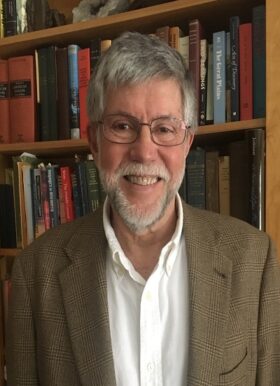
Wayne Fields
Doctor of Humane Letters
Wayne Fields, PhD, never set out to become a professor. During his childhood, his father was a construction worker and the family moved throughout the Midwest before settling in Rock Island, Illinois. His parents and grandparents believed profoundly in education. They insisted that Wayne and his siblings attend college.
“I grew up in a family where storytelling was a very important activity,” he told the Washington University Record in 1992. “Sometimes it’s more important in blue-collar families than wealthy ones. My father believed in labor unions and argued for them, trying to convince people they could work together and improve their lives. Words — stories and arguments — mattered to us.”
Today it is hard to overstate the impact that Dr. Fields has had at Washington University. Since joining the faculty of Arts & Sciences — as an instructor, in 1968 — he has been an influential teacher and held a series of key leadership appointments.
From 1987 to 1992, he served as acting chair and then chair of the Department of English. He was director of the Master of Liberal Arts Program from 1986 to 1992 and dean of University College, the professional and continuing education division of Arts & Sciences, from 1992 to 1996.
In 1996, he became founding director of the American Culture Studies Program, which he led until 2008. He served as founding director of the John C. Danforth Center on Religion and Politics from 2010 to 2011.
In 1999, he was named the university’s inaugural Lynne Cooper Harvey Distinguished Professor. From 2011 to 2012, he served as part of the transitional leadership team for Arts & Sciences, following the death of his close friend Dean James E. McLeod.
A nationally known expert on American literature, rhetoric and nonfiction prose, Dr. Fields has written widely for American Heritage, Newsday, St. Louis Magazine and other publications.
He has written a memoir, What the River Knows: An Angler in Midstream (1990), a highly acclaimed nonfiction book about fly fishing, the mysteries of rivers and the uncertainties of life’s second half; and The Past Leads a Life of Its Own (1992), a collection of stories that capture a simpler life of growing up in the American heartland.
He edited James Fenimore Cooper: A Collection of Critical Essays (1979) and his essays include “One Hundred Years of Solitude and New World Storytelling,” “The American Adams,” “To Redeem from Ignorance: Jefferson and the Liberal Arts” and “When the Fences are Down: Language and Order in The Adventures of Tom Sawyer and Huckleberry Finn.”
His book Union of Words: A History of Presidential Eloquence (1996) examined the use of rhetoric in presidential speeches, from declarations of candidacy to nomination acceptances, inaugural addresses, state-of-the-union speeches and other special addresses.
During times of national political debate, he has been frequently called on by national and international media, including National Public Radio, The New York Times, The Washington Post and Voice of America to provide expert commentary regarding the use of rhetoric as a political or social tool.
Dr. Fields, now the Lynne Cooper Harvey Chair Emeritus in English and professor of English, earned a bachelor’s degree in literature from Augustana College in Rock Island in 1964. He earned a master’s degree the following year and a doctorate in 1972, both from the University of Chicago.
Over the years, Dr. Fields has served on numerous academic and advisory committees, including the Arts & Sciences Academic Planning Committee, the school’s Faculty Council and the Task Force on Undergraduate Curriculum, which issued recommendations for revising the Arts & Sciences undergraduate course of study.
He has received numerous teaching awards, including the Faculty Award for Excellence in Teaching, the Distinguished Faculty Award at Founders Day, the Burlington-Northern Teaching Award, a University College Teaching Award and the Interfraternity Council Excellence in Teaching Award.
Other honors include fellowships from the Woodrow Wilson Institute, the Ford Foundation and the National Humanities Institute.
He now lives in Iowa City with his wife, Joni, and their daughter, Ellen, who is a rising sophomore at Washington University. He shares with Karen Fields three children and their families: Sarah Fields and Dawn Comstock; Elizabeth and Matthew Brooks and their children, Jacob, Sarah and Mathilda; and Aaron and Kathleen Fields and their children, Bergen and Boden.